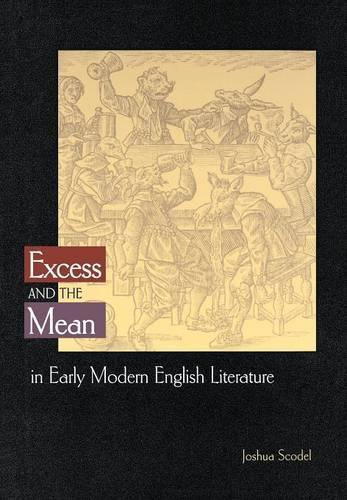
Excess and the Mean in Early Modern English Literature
(Hardback)
Publishing Details
Excess and the Mean in Early Modern English Literature
By (Author) Joshua Scodel
Princeton University Press
Princeton University Press
4th June 2002
United States
Classifications
Professional and Scholarly
Non Fiction
Literary studies: c 1600 to c 1800
Ancient Greek and Roman philosophy
Medieval Western philosophy
820.9003
Physical Properties
Hardback
376
Width 152mm, Height 235mm
680g
Description
This book examines how English writers from the Elizabethan period to the Restoration transformed and contested the ancient ideal of the virtuous mean. As early modern authors learned at grammar school and university, Aristotle and other classical thinkers praised "golden means" balanced between extremes: courage, for example, as opposed to cowardice or recklessness. By uncovering the enormous variety of English responses to this ethical doctrine, Joshua Scodel revises our understanding of the vital interaction between classical thought and early modern literary culture. Scodel argues that English authors used the ancient schema of means and extremes in innovative and contentious ways hitherto ignored by scholars. Through close readings of diverse writers and genres, he shows that conflicting representations of means and extremes figured prominently in the emergence of a self-consciously modern English culture. Donne, for example, reshaped the classical mean to promote individual freedom, while Bacon held extremism necessary for human empowerment.Imagining a modern rival to ancient Rome, georgics from Spenser to Cowley exhorted England to embody the mean or lauded extreme paths to national greatness. Drinking poetry from Jonson to Rochester expressed opposing visions of convivial moderation and drunken excess, while erotic writing from Sidney to Dryden and Behn pitted extreme passion against the traditional mean of conjugal moderation. Challenging his predecessors in various genres, Milton celebrated golden means of restrained pleasure and self-respect. Throughout this groundbreaking study, Scodel suggests how early modern treatments of means and extremes resonate in present-day cultural debates.
Reviews
"A worthy contribution to the ongoing study of the mentality of the early modern period and its relationship to the classical and Christian heritage."--Choice "[Scodel's] range of material and reference is admirable. He moves easily and with panache through five sections... There is much to admire and learn from in Excess and the Mean in Early Modern English Literature."--Andrew Hadfield, Times Literary Supplement "An excellent book, ambitious in scope and masterful in its management of scholarly resources and interpretive techniques."--Jon A. Quitslund, Renaissance Quarterly
Author Bio
Joshua Scodel is Associate Professor of English, Comparative Literature, and the Humanities at the University of Chicago. He is the author of The English Poetic Epitoph.
